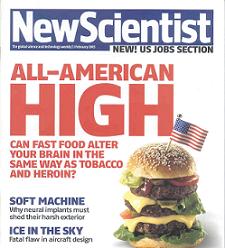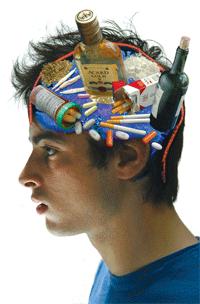The Science of Addiction, The Myth of Choice
Posted by The Situationist Staff on April 7, 2007
Helen Phillips of New Scientist has a fascinating article on how our brains unknowingly become addicted to different behaviors and forms of consumption, and how whether we become addicted to something depends largely on the situations in which we find ourselves rather than the choices we make. Several Situationist contributors have explored this topic in other writings, including in the law review article “Broken Scales: Obesity and Justice in America,” and in Situationist posts “FDA Wants Informed Choice” and “The Intersection Between Tort Law and Social Psychology in Violent Videogames.” We have excerpted pieces of Phillips’ article below.
* * *
 There’s a common perception that overindulgence in certain behaviours is all down to individual choice. If you are overeating, oversexed, gambling away your earnings or spending all your time online, you are more likely to be considered morally abhorrent than the victim of a disease. Calling these problems “addictions” has triggered debates about whether our society or our biology is to blame, and whether people that fall foul of a behavioural obsession should be offered help and treatment rather than punishment.
There’s a common perception that overindulgence in certain behaviours is all down to individual choice. If you are overeating, oversexed, gambling away your earnings or spending all your time online, you are more likely to be considered morally abhorrent than the victim of a disease. Calling these problems “addictions” has triggered debates about whether our society or our biology is to blame, and whether people that fall foul of a behavioural obsession should be offered help and treatment rather than punishment.
* * *
Several studies of the brain and behaviour back the idea that there’s very little biological difference between what goes on in the head of a gambling addict and that of a crack addict. A growing number of researchers believe that the same processes lie behind all addictions, behavioural or chemical, whether it’s gambling or shopping, computer gaming, love, work, exercise, pornography, eating or sex. “They have more in common than different,” says Sabine Grüsser-Sinopoli, who runs a clinic and research lab for behavioural addictions at the Charité Medical University in Berlin, Germany. “Addiction is all the same.”
* * *
More and more people are going to clinics asking for help to control the need to shop, have sex or gamble, because their behaviour is ruining their lives, says Grüsser-Sinopoli. Technological advances, especially the rise in popularity of the internet, are increasing the opportunities we have to engage in potentially addictive behaviours. The Center for Online Addiction, an educational and treatment group founded just over a decade ago by psychologist and internet addiction specialist Kimberly Young, now of St Bonaventure University in New York, estimates that as much as 5 to 10 per cent of the US population is addicted to some kind of internet-based activity, be it gaming, gambling, or using chatrooms and email.
Problem gambling is perhaps the most harmful of these. A 2000 survey commissioned by the British National Centre for Social Research revealed that about 1 per cent of the UK adult population had a pathological gambling problem, and the repeat survey, due out in a few months, is widely expected to show a rise – especially among women. Some researchers predict as many as 10 per cent of the US population will soon have a gambling problem. Record numbers of people are signing up to online gambling sites – the industry is now worth an estimated $12 billion – prompting a new US bill that aims to tighten restrictions on the practice. Around half of the new entries in this year’s “rich list” published by The Sunday Times in London have made their money running internet gambling sites or casinos.
The debate about whether behaviour can be considered a true addiction is not an entirely new one. In 1975, psychologist Stanton Peele wrote a book called Love and Addiction, which argued that all kinds of drug and non-drug experiences, including love, could be described as addictions. At the time, this was a term only really used to describe heroin abuse, he says. But look at how we talk about a lost love, and how similar to drug withdrawal it sounds: we are unable to think of anything else or to get out of bed, we’re crying and physically in pain. “There really is no way to differentiate the behaviour of gambling, a love affair or pursuing a drug,” he says.
The evidence that behavioural addictions are very similar to chemical ones is mounting from brain studies too. According to addiction specialist Eric Nestler of the University of Texas Southwestern Medical Center in Dallas, drug addictions and “natural” addictions seem to involve shared pathways in the brain. “Take a person with sex addiction, or a pathological gambler: their brains all show abnormal responses – the same reactions to drugs of abuse,” he says.
All pleasurable stimuli, natural and unnatural, act on the same “reward” circuitry in the brain. When we find something desirable, the brain chemical dopamine is released in the brain. Drugs of abuse all cause dopamine release, triggering a desire to keep taking them. Pleasurable behaviours are rewarding too and also release dopamine. The fact that behaviours and drugs of abuse converge on the same brain circuit is not enough to prove they can both be addictive, but there are more specific changes that do seem to be characteristic of addiction.
* * *
One other compulsive behaviour that has been controversial in the discussion of addiction is eating behaviour. Whether we could actually get hooked on food is controversial, but there are signs that delta Fos B rises in animals that compulsively consume sugar, suggesting sugar might be addictive in some cases.
Bart Hoebel, a psychologist from Princeton University, believes we can be addicted to food – at least to sugar (New Scientist, 1 February 2003, p 26). He has shown that rats bingeing on sugar release dopamine in the same way as rats given high doses of addictive drugs, and doing so can cause lasting changes in the dopamine system, withdrawal symptoms and cross-sensitisation to other drugs, including amphetamines. Very sweet foods can induce a form of dependency, he believes.
One thing that this focus on behavioural addictions highlights is that we all have the potential to be addicts, says Jim Orford of the University of Birmingham, UK, author of a report on behavioural addictions for the UK Office of Science and Technology. “Almost any of us can become behavioural addicts, given the right exposure, the right timing and so on,” he says. “But there are multiple causes: our personalities, genetics – it’s not simple.” Why some people develop addictions while others can safely dip into these activities with no ill effects is still unknown.
* * *




















Doug S. said
I don’t trust New Scientist ever since they published an article about a propulsion system that contradicts conservation of momentum.
joefelso said
If, as this article suggests, “All pleasurable stimuli, natural and unnatural, act on the same ‘reward’ circuitry in the brain,” I’d want to know why some brains become addicted to those pleasures and others do not. If we risk addiction whenever we receive desirable stimulus, we have little hope of beating addiction without understanding deviants who don’t become hooked. An evolutionary biologist might ask what adaptive advantage may arise from addiction that has made the problem so widespread–I’d be curious to hear an answer to that myself–but children of parents with addictive personalities and, for that matter, the parents of any child can’t afford to be so abstract.
Doug S. said
This is an interesting speculation.
PsychBLOG.co.uk » Addiction is all the same said
[…] there has been a flurry of articles on addiction, the reasons why we become addicted and why do we continue to abuse these […]
Free Will and Me « Information Spillway said
[…] debate concerning actions such as gambling, obesity, and video gaming. The Situationist Blog has a post from April that explores the some of the new research into addiction. Biology is […]
The Situation of Gambling « The Situationist said
[…] BERDIK: Addiction researchers are conducting clinical trials on drugs to help treat problem gamblers, but no matter what scientists discover those who work with compulsive gamblers say that breaking the habit will always take more than a pill. It often takes major lifestyle changes. * * * Below we’ve the initial portions of a news article from an Atlantic City news channel, “Compulsive Gambler Files $20M Suit Against Casinos.” * * * She was an ambitious lawyer and TV commentator who starting going to Atlantic City casinos to relax, and soon was getting high-roller treatment that included limousines whisking her to the resort. Arelia Margarita Taveras says she was even allowed to bring her dog, Sasha, to the blackjack tables, sitting in her purse. But her gambling spun out of control: She said she would go days at a time at the tables, not eating or sleeping, brushing her teeth with disposable wipes so she didn’t have to leave.She says her losses totaled nearly $1 million.Now she’s chasing the longest of long shots: a $20 million racketeering lawsuit in federal court against six Atlantic City casinos and one in Las Vegas, claiming they had a duty to notice her compulsive gambling problem and cut her off.”They knew I was going for days without eating or sleeping,” Taveras said. “I would pass out at the tables. They had a duty of care to me. Nobody in their right mind would gamble for four or five straight days without sleeping.”Experts say her case will be difficult to prove, but it provides an unusually detailed window into the life of a problem gambler. * * * To read the rest of the article, click here. To watch an ABC video reporting on a compulsive gambler who is suing a casino, click here. To read some related Situationist posts, go to “Crazy Little Thing Called Love” and “The Science of Addiction, The Myth of Choice.” […]
Uncle $cam said
Stanton Peele is full of shit, and the New Scientist is a propagenda arm of the CIA, NSA. Notice I said,propagenda, not propaganda. Addiction sells, and these dinks have no interest in helping the public to discovery nor, recovery.
Emilio Aguayo said
In their mind, it is like asking what hand they are keeping at the poker table. Although the sport has a lot of different versions, all variations adhere to the same fundamental pattern.